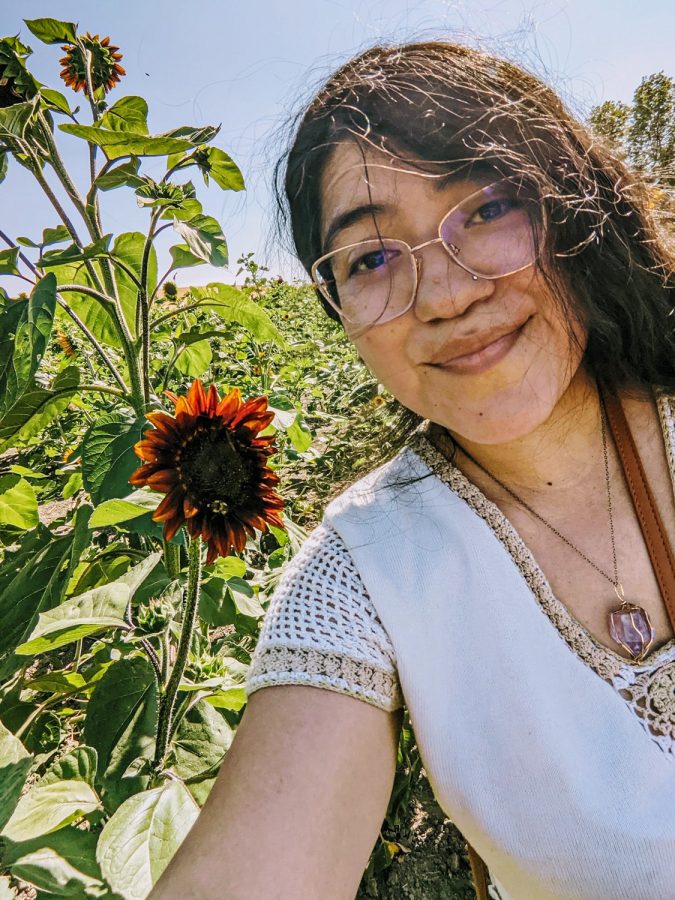First-generation college students overcome adversity pursuing advanced degrees
Two students say application process not intuitive
Carla De Lira is working toward a doctorate in computer science.
March 11, 2022
Isolation is a word both WSU students Carla De Lira and Amanda Kaufman use to describe their experiences as first-generation college students.
As a first-generation student, De Lira, who is working toward a doctorate in computer science, said she feels a large amount of pressure to do well because she is the first one in her family to attend college.
In a way, De Lira said she is representing her family.
“Being first-generation predisposes you to certain obstacles just because you’re the first one who’s navigating it,” De Lira said.
Kaufman, senior microbiology major, said she was 21 when she arrived on campus. In the beginning, it felt isolating for her because she was struggling to find people with a similar low-income first-generation background as her.
To build community, Kaufman said she got involved with fencing, an activist group about feminism and the Tri-Alpha honor society.
Kaufman’s journey into medicine is a long one. As a child, she said college was never seen as an option. Career counselors did not mention college or vocational school as a feasible plan.
After high school, Kaufman said she worked as a medical scribe in an emergency room. It was there she saw the great need for doctors in the county she lives in, Grays Harbor.
Many people would go into the emergency room for routine care because there were not enough primary care providers in the county, she said. In addition, there were not any local cardiologists.
Soon after Kaufman earned her associate’s degree, she realized she wanted to get a bachelor’s degree as well. However, as a first-generation student, she quickly realized she had no idea how to navigate the college application process.
Kaufman said it took two application cycles for her to submit all the necessary documents because she did not complete the application correctly the first time. While applying the second time, she utilized various online forums and met with admission counselors.
De Lira also had a difficult time with the application process and felt she got “shot out of the void” when it came to filling out all the required documents like the Free Application for Federal Student Aid.
“My fear of college ended up happening before it started,” she said.
Her dad worked as a bus driver, making it hard for him to help since he worked long hours. Although De Lira’s mother was home, she mainly spoke Spanish and could not help as much as she wanted to because of the language barrier.
After making it through the application process, she decided to attend California Lutheran University and study computer science. As a first-generation student, De Lira said she did not fully understand how much a private university costs compared to a public university.
This financial situation caused a significant amount of financial stress to her and her family as they tried to keep up with the cost of tuition, she said.
Despite the various obstacles, De Lira said her family supported her through it all. When she was a child, her father would get computer parts from Goodwill for her to build computers from.
Once she started navigating college, De Lira said she found the TRIO program’s Student Support Services to be a helpful resource. The program guides low-income first-generation college students on how to be academically successful and help students reach their college goals.
After finishing her bachelor’s degree in computer science, De Lira said she realized she wanted to get an advanced degree that allowed her to conduct research and teach.
Once she decided to skip completing a master’s program, De Lira said she came straight to the doctoral program at WSU.
De Lira said she chose WSU because of the stability it offered her. The cost of living in Pullman was reasonable, and she was able to get a teaching assistantship. Even better, her academic plans aligned with WSU’s computer science program.
In the computer science program, De Lira said the demographic of people is not similar to herself. This can be incredibly isolating and hard for her not to be around people who have similar experiences.
Currently, she researches the emotional response of people learning how to code. If one of the coders were to make a mistake, a program would ask the coder how they feel. If the coder continues to make mistakes, it recommends the coder connects with someone who is feeling a bit more optimistic, she said.
Before attending WSU, Kaufman said she had never taken a physics or chemistry class. To remedy this, she spent a significant amount of time with the tutors learning how to study effectively.
On campus, Kaufman found many people are embarrassed to be a first-generation college student. They think that makes them seem uneducated or that they come from an uneducated background.
“I feel proud to be a first-generation student. It’s always something I mention; I’m a TA for [microbiology] 101. It’s the first thing I say,” Kaufman said.
Editor’s note: This story has been updated to correct information about the TRIO program.









